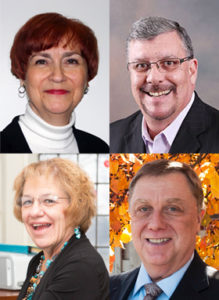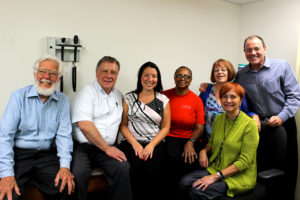Collaboration is key to success for United Church of Christ ministries in St. Louis

Clockwise from up left: Mary Alice Ryan, St. Andrew’s; Michael Brennan, Every Child’s Hope; David Campbell, IFM; and Donna Smith-Pupillo, Deaconess Nurse Ministry
It’s an old — yet, brand new — United Church of Christ health and human service collaboration in St. Louis. Two health care providers have partnered with a low-income older adult housing facility and a ministry for children in trauma to provide increased medical care, and it’s making an impact throughout the city.
The Institute for Family Medicine is one of the newest CHHSM-member ministries, yet traces its roots back to the 19th-century Deaconess movement of Evangelical Church. Deaconess Nurse Ministry also has roots in the Deaconess movement. The two have partnered with St. Andrews, a provider of choices and options for seniors including low-income housing, and Every Child’s Hope, a ministry for at-risk children and youth, to bring a new level of services to the residents and clients.
“This is an amazing story of collaboration,” says Michael Readinger, president and CEO of the UCC’s Council for Health and Human Service Ministries. “These four CHHSM-member ministries have come together to staff clinics throughout St. Louis, thus bringing a more effective level of care to both older adults and at-risk children throughout the area.”
IFM already had partnerships with St. Andrews and Every Child’s Hope, staffing clinics on their campuses. Adding Deaconess Nurse Ministry provides additional caring services for the residents.
“The combination of the on-site physician or nurse practitioner from IFM with the regular presence of a nurse from Deaconess Nurse Ministry brings a comprehensive primary health care service to schools, shelters, housing facilities, and other social service organizations,” says David C. Campbell, president and CEO of the Institute for Family Medicine.
Better Care for Older Adults
At St. Andrews, President and CEO Mary Alice Ryan is excited about the partnership. “We wanted to find a way to not only keep our residents longer in our communities but keep them healthier,” she says. “We were concerned about the high number of 911 calls in our HUD 202 communities where the residents do not have ready access to health care. We thought it would make sense to bring the provider to them.”
Since the collaboration began, Ryan reports that there have been reduced emergency room visits, reduced hospital admissions, an increase in the stabilization of chronic diseases, a decrease in residents’ depression and anxiety levels, increased physician visits and engagement, and a decrease in falls.
“We decided to work at staffing these clinics [with our CHHSM partners to] provide care for the most vulnerable — low-income seniors, and children and youth,” says Donna Smith-Pupillo, executive director of Deaconess Nurse Ministry. “We are aware that when you do what is in your ‘wheelhouse’ in service delivery, and everyone else does their part as well, the care offered is more full and impactful.”

CHHSM President and CEO Michael Readinger (far right) meets with IFM Board Chair the Rev. Richard Ellerbrake, IFM President and CEO David Campbell, IFM provider Jackie Watson, Deaconess Nurse Ministry provider Mary Johnson-Ishmon, Deaconess Nurse Ministry Executive Director the Rev. Donna Smith-Pupillo, and St. Andrew’s President and CEO Mary Alice Ryan.
Caring for the Youngest
Every Child’s Hope was founded in 1858 as Evangelical Children’s Home by the Rev. Louis Nollau, namesake of CHHSM’s Nollau Institute that trains leaders of service ministries. Today, a staff of more than 200 people at Every Child’s Hope works to prevent child abuse, treat emotional trauma and mental health issues, and provide aftercare and follow-up services. Executive Director Michael P. Brennan sees the collaboration as beneficial to the entire St. Louis community.
The populations “are all underserved [and] struggle to have good access to quality physical health care services,” he says. “These arrangements remove barriers to access that otherwise would hinder their ability to receive ongoing care from medical professionals.”
Working with IFM and Deaconess Nurse Ministry means that vital medical services are provided to the at-risk children and youth who need them, Brennan says. “Every Child’s Hope is not a medical facility, and the ability for our collaborative partners to provide us with high quality medical care for clients and provide clinical oversight is a huge benefit to ECH and our clients.”
It’s “a win/win for the collaborating partners and, most importantly, for the clients we are honored to serve,” he adds.
Pupillo sees the partnership as a way “to continue to work with others for health and wholeness.”
“So often, agencies work independently, trying to do all things,” she says. “However, the community and people are served more wholistically when the work is done in a collective, collaborative way.”
What’s ahead? Brennan says he hopes there can be further collaborations with other local CHHSM partners.
“Every Child’s Hope remains committed to the mission of CHHSM and the leadership development training provided through the Nollau Institute,” he says. “We are highly engaged with all of the local CHHSM agencies and meet on a regular basis to share learnings, happenings and opportunities.
“CHHSM is the glue that binds us all together as one family striving to be good servant leaders as individuals and as faith-based agencies.”
Join Our Mailing LIst
Follow on Facebook
Iredell Adult Day Services Hosts Ribbon-Cutting to Celebrate Adult Day Health Certification - CHHSM
www.chhsm.org
Iredell Adult Day Services (IADS) in Newton, N.C. — a nonprofit organization dedicated to caring for older adults, vulnerable groups, and their families, and part of EveryAge — hosted a ribbon cut...